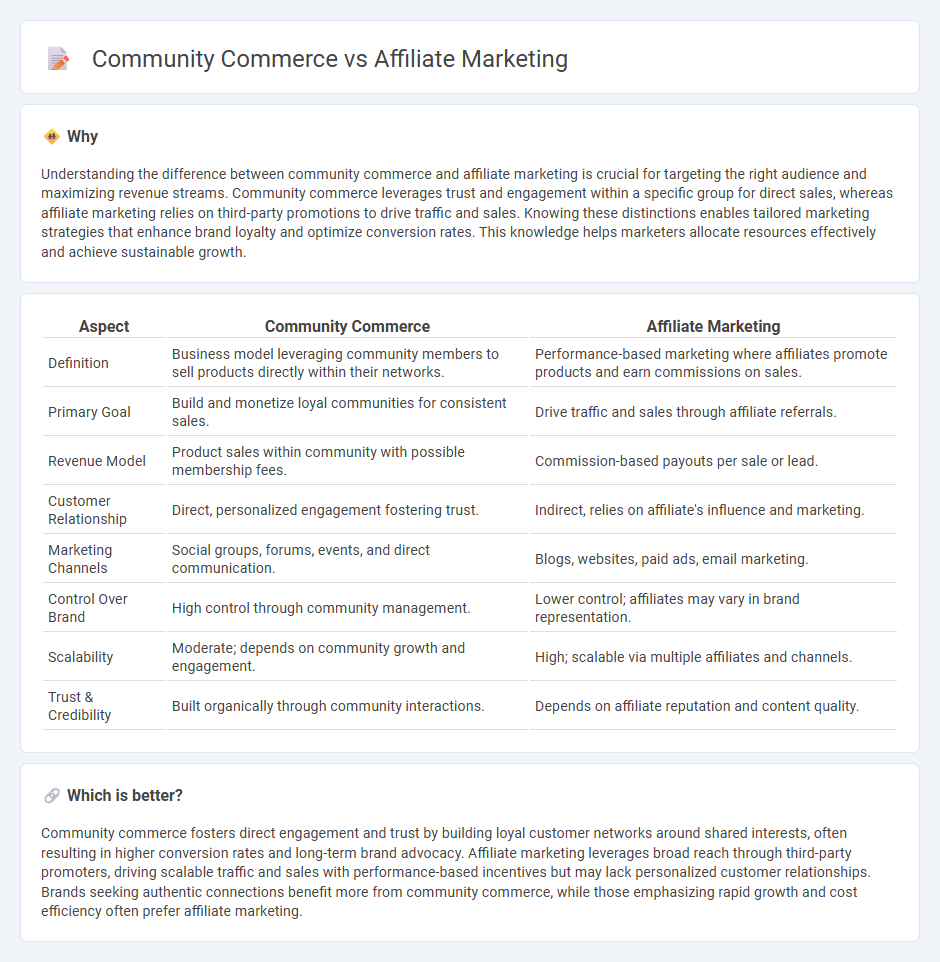
Community commerce focuses on building strong, trust-based relationships within niche groups to drive sales through genuine engagement and shared interests. Affiliate marketing leverages third-party promoters who earn commissions by referring customers to products or services, emphasizing measurable performance and wide-reaching networks. Explore the differences and benefits of each approach to optimize your marketing strategy effectively.
Why it is important
Understanding the difference between community commerce and affiliate marketing is crucial for targeting the right audience and maximizing revenue streams. Community commerce leverages trust and engagement within a specific group for direct sales, whereas affiliate marketing relies on third-party promotions to drive traffic and sales. Knowing these distinctions enables tailored marketing strategies that enhance brand loyalty and optimize conversion rates. This knowledge helps marketers allocate resources effectively and achieve sustainable growth.
Comparison Table
| Aspect | Community Commerce | Affiliate Marketing |
|---|---|---|
| Definition | Business model leveraging community members to sell products directly within their networks. | Performance-based marketing where affiliates promote products and earn commissions on sales. |
| Primary Goal | Build and monetize loyal communities for consistent sales. | Drive traffic and sales through affiliate referrals. |
| Revenue Model | Product sales within community with possible membership fees. | Commission-based payouts per sale or lead. |
| Customer Relationship | Direct, personalized engagement fostering trust. | Indirect, relies on affiliate's influence and marketing. |
| Marketing Channels | Social groups, forums, events, and direct communication. | Blogs, websites, paid ads, email marketing. |
| Control Over Brand | High control through community management. | Lower control; affiliates may vary in brand representation. |
| Scalability | Moderate; depends on community growth and engagement. | High; scalable via multiple affiliates and channels. |
| Trust & Credibility | Built organically through community interactions. | Depends on affiliate reputation and content quality. |
Which is better?
Community commerce fosters direct engagement and trust by building loyal customer networks around shared interests, often resulting in higher conversion rates and long-term brand advocacy. Affiliate marketing leverages broad reach through third-party promoters, driving scalable traffic and sales with performance-based incentives but may lack personalized customer relationships. Brands seeking authentic connections benefit more from community commerce, while those emphasizing rapid growth and cost efficiency often prefer affiliate marketing.
Connection
Community commerce leverages social networks and shared interests to drive product recommendations, creating a trusted environment that enhances affiliate marketing performance. Affiliate marketers capitalize on these engaged communities by embedding referral links within authentic content, increasing conversion rates and expanding brand reach. The synergy between community commerce and affiliate marketing fosters organic growth, as peer influence amplifies marketing efforts and consumer trust.
Key Terms
Commission Structure
Affiliate marketing typically operates on a pay-per-sale or pay-per-click commission structure, rewarding affiliates based on individual transactions they drive. Community commerce often employs a tiered or group-based commission system, incentivizing collaborative sales efforts within a network to maximize collective revenue. Explore the differences further to determine which commission model best suits your business goals.
User Engagement
Affiliate marketing relies on strategic partnerships to drive sales through tracked referrals, emphasizing conversion rates and commission-based incentives. Community commerce centers on building a loyal user base by fostering interactions, shared values, and collaborative experiences that enhance engagement and customer retention. Explore how these approaches impact user engagement to optimize your digital marketing strategy.
Influencer Collaboration
Affiliate marketing utilizes influencers primarily to drive direct sales through tracked links and commissions, leveraging individual reach for measurable performance. Community commerce emphasizes building a trusted network where influencers foster authentic engagement and long-term brand loyalty within a shared audience. Explore deeper insights into influencer collaboration strategies to enhance your marketing impact.
Source and External Links
Affiliate Marketing 101: What it is and How to Get Started - Affiliate marketing is a process where affiliates earn commissions by promoting another company's products or services to consumers, with the seller, affiliate, and consumer all playing key roles in the ecosystem.
Affiliate Marketing Guide: All You Need To Know (2025) - Shopify - Affiliate marketing is a performance-based strategy where individuals or businesses earn rewards--usually a commission--for driving sales, leads, or other valuable actions through unique tracking links provided by brands.
Amazon Associates Central - The Amazon Associates Program enables content creators, bloggers, and publishers to monetize their traffic by recommending Amazon products and earning commissions on qualifying purchases made through their unique links.
 dowidth.com
dowidth.com